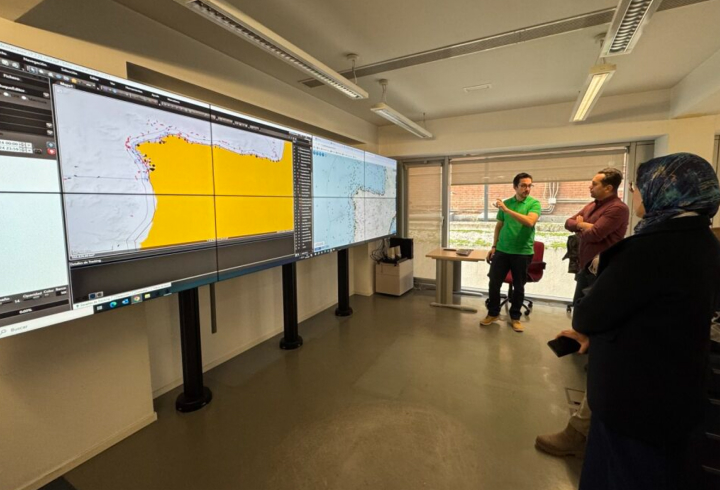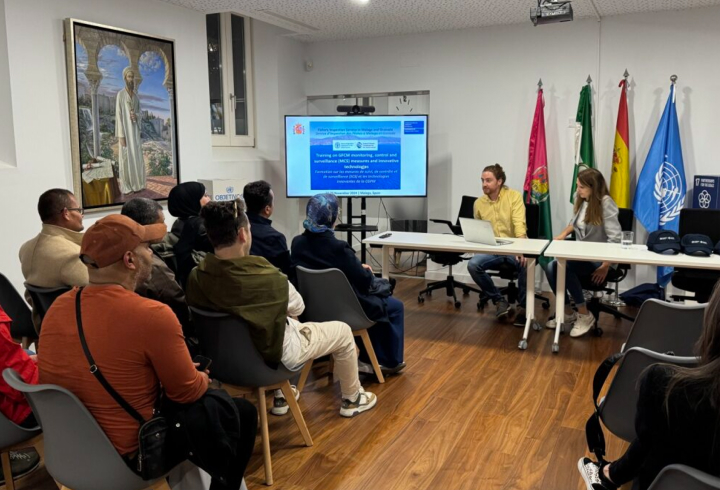From coast to coast: enhancing cooperation to eradicate IUU fishing in the Mediterranean

Illegal, unreported, and unregulated (IUU) fishing remains a major threat to marine ecosystems, undermining sustainable fisheries and biodiversity conservation. By preying on weak management systems and enforcement gaps, particularly in countries with limited capacity for effective monitoring and control, IUU fishing accelerates the depletion of fish stocks, damages habitats, and undermines conservation initiatives. Tackling IUU fishing is therefore a critical environmental imperative to protect the health of our oceans.
The GFCM is leading efforts to address this issue through targeted, collaborative actions that prioritize the long-term sustainability of marine ecosystems. As part of the GEF-funded Fisheries and ecosystem-based management for the blue economy of the Mediterranean (FishEBM MED) project, the GFCM has undertaken initiatives that aim to thwart IUU fishing at every level. These include strengthening national legislation to align with sustainable fisheries management goals and offering specialized training for fisheries inspectors to enhance enforcement capacity. By empowering stakeholders with the tools and knowledge to combat IUU fishing, the GFCM is advancing environmental conservation while promoting a sustainable blue economy for future generations.

© FAO-GFCM/Ahmed Siliman
Cooperating to deploy innovative monitoring techniques and technologies
Strengthening cooperation and partnerships among national authorities is central to the GFCM's capacity development efforts. In November 2024, officials from eight GFCM countries convened in Spain for a training on monitoring, control and surveillance (MCS) measures and innovative technologies. The training aimed to boost technical capacities and foster regional collaboration in the fight against IUU fishing. This five-day initiative, organized by the GFCM with the financial support of the Government of Spain and the GEF, brought together inspectors from Albania, Algeria, Egypt, Montenegro, Morocco, Libya, Tunisia and Türkiye. The programme included training sessions and field visits designed to improve their monitoring, control, and surveillance (MCS) capabilities.
The event underscored the critical role of capacity development and the effective implementation of international tools to combat IUU fishing. Training sessions focused on MCS measures and innovative technologies, fostering the transfer of knowledge and development of practical skills to advance the objectives of the GFCM 2030 Strategy and promote a culture of compliance across the Mediterranean.

© FAO-GFCM/Ahmed Siliman
Nurturing stronger cooperation among national authorities from GFCM countries and building synergies across several subregions and fisheries contexts have led to the establishment of a platform to exchange experiences, best practices, and challenges related to the implementation of MCS measures. The involvement of the GFCM Technical Unit in Malaga, the Spanish Fisheries Monitoring Centre (FMC), and national fisheries inspectors from eight countries was instrumental to facilitating this knowledge exchange and ensuring its permanence into the future. Since joining the GFCM in 1953 as one of its first contracting parties, Spain has been a champion in the fight against IUU fishing. By implementing comprehensive sanctioning measures and advanced monitoring systems, Spain has enhanced its enforcement capabilities, and through initiatives such as this training, it remains committed to sharing these tools with other countries, fostering capacity-building, collaboration and regional progress in combating IUU fishing.
In the words of a participant from Libya: "I am very pleased with the training and its outcomes, which have provided me with valuable knowledge. I was introduced to innovative technologies, such as VMS and drones, which were quite new to me. In terms of potential benefits for my country, I believe that using short-range drones for inspections is a feasible and effective option. During the training, we tested the drones at the port, and incorporating this approach into the inspection process has the potential to significantly improve the results."
This activity in Spain also served as a pivotal opportunity to discuss the GFCM’s joint inspection schemes, which are a voluntary tool relying not only on technical understanding but also on robust partnerships between neighbouring countries. This initiative equipped inspectors with the means to coordinate their actions, share information and data, and effectively implement GFCM decisions, ultimately furthering the objective of the FishEBM MED project to enhance the capacity of countries to manage fisheries in the region.

© FAO-GFCM/Ahmed Siliman
These joint efforts are expected to contribute significantly to the fight against IUU fishing in the GFCM area of application. Given the transboundary nature of many marine living resources, the success of MCS efforts is highly dependent on collaborative actions that are essential to ensuring the consistent application of inspection measures, such as fishing logbook reviews, catch certifications and mesh size measurements. Effective inspections deter violations, levelling the playing field in the fight against IUU fishing in the Mediterranean and beyond.
One of the participants, from Montenegro, highlighted that "this was the first time I attended such a training, and it was a truly valuable experience. We all gained new skills, such as learning how to measure nets and operate drones. Montenegro is a small country, with only 20 fishers operating vessels over 15 m in length. Our daily work is closely related to what we observed during the training. Sharing experiences and visiting ports and facilities is essential for professional growth and development. I highly recommend organizing such trainings in the future."
Thanks to this training, inspectors are now better prepared to operate cutting edge tools, including advanced vessel tracking systems, sales notes and declaration documents, real-time data reporting, and enhanced surveillance techniques. These kinds of activities under the FishEBM MED project enable the GFCM to continue improving fisheries management by integrating new technologies and strengthening regional compliance mechanisms.
Building on solid legal foundations
These operational developments build upon the legal framework for the fight against IUU fishing developed by the GFCM. In this context, the FishEBM MED project has also been supporting initiatives to reinforce national legal frameworks. In October 2024, officials from the aforementioned countries participated in a workshop to conduct a granular analysis of countries’ transposition of GFCM decisions into their national legal frameworks, leveraging the legal and technical expertise of the Association internationale du droit de la mer (AssIDMer). This meeting provided an opportunity to share insights into national legislative and regulatory procedures that have helped some countries foster and maintain harmony between their domestic laws and regional and international fisheries obligations. Countries also used the occasion to discuss the elaboration of national plans of action to fight IUU fishing and exchange best practices to engage in sustained, coordinated efforts to eliminate this scourge. Some of the priorities identified through these discussions included the continuous revision of national fisheries laws, the implementation of the GFCM Regional plan of action for the fight against IUU fishing and the ratification of the FAO Port State Measures Agreement (PSMA).

© FAO-GFCM/Ahmed Siliman
A participant from Morocco, highlighted that "The training in Malaga was very engaging. Exploring the integrated information database was particularly valuable, as it provided essential tools for inspections and traceability verification. Observing port inspections was enlightening, and I would recommend including in future trainings more of the traceability process beyond the initial sale, including the steps leading to exports. For someone like me working on the catch documentation scheme, this would be particularly useful. Another highlight was the risk analysis platform, a new tool that could be adapted to improve our operations."
Thanks to the FishEBM MED project, the GFCM is actively integrating activities to implement adequate fisheries laws with efforts to ensure that inspectors have all the technical competences to apply these laws effectively and consistently. Theory and practice are being synergized to keep our seas healthy and protect the livelihoods of coastal communities across the region.
